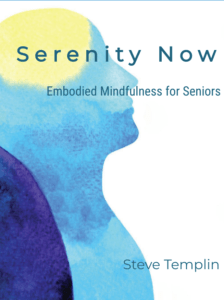Over the years I’ve become acutely aware that the avoidance of stressful feelings is a major cause of both physical and emotional suffering. I know this sounds counter-intuitive, but over and over, I’ve seen both physical pain and anxiety ease or vanish as stressful feelings were safely experienced, rather than resisted.
My experience jibes with some notable research. A National Institutes of Health study published in 2004 revealed that 85% of all medical visits were stress-related. The study was based on over 300 research papers published over the previous thirty years.
So what’s interesting is that while stress related illness is apparently a universal human phenomenon most people, at least in my experience, have a difficult time accepting this notion. And they have a built in reluctance to feeling their stressful feelings …. which then fuel stress-related symptoms.
However, there’s a minority population among us for whom the idea of stress-related illness makes more sense. There’s something about their inner wiring that says, “Of course my mind and body are connected”. They somehow sense that ignoring, avoiding, or stuffing feelings isn’t good for them …. not only emotionally but physically as well.
And most importantly, they’re more open to learning how to feel their feelings …. which leads to new possibilities for self- healing.
The Highly Sensitive Person
It’s likely that you or someone you care about is a highly sensitive person. Yes, that’s a thing. And if you’ve ever been told that you were ‘too sensitive’ there’s a good chance that term applies to you.
This is a genetic trait that was discovered 30 years ago by psychologist Elaine Aron, Ph.D. It’s a form of heightened sensory processing that causes some individuals (about 15-20% of the population) to feel and think more deeply.
The downside to the highly sensitive trait is that it often contributes to more emotional or physical suffering, in part because it so poorly understood by the public at large and by those who share the trait as well.
While high sensitivity is usually discussed from a psychological perspective because of how it affects one’s emotional life, it’s also bears a significant influence on one’s physical health.
Individuals with this form of heightened nervous system sensitivity are more vulnerable to stress-induced pain, anxiety, and chronic illness.
It became apparent to me that the minority population I found that were receptive to the idea of stress-related illness were in fact highly sensitive people.
I also find it interesting that John Sarno, M.D., one of the originators of mindbody medicine, reported that only about 20% of the individuals he diagnosed with TMS (a stress-related pain syndrome) could accept the diagnosis and follow through with a mindbody approach to treatment.
Since sensitivity is often ridiculed in our culture it can be a revelation to the highly sensitive person that there’s not only a good reason for their ‘differentness’, but that they can learn to take advantage of the trait for their emotional and physical well-being.
HSP’s Experience More Chronic Pain, Anxiety, or Illness
While everyone is vulnerable to the growing epidemic of stress-induced pain, anxiety, and illness, the individual with a highly sensitive brain and nervous system is even more vulnerable.
We can make sense of the NIH study mentioned earlier by understanding that chronic stress upsets the balanced functioning of the vagus nerve and the autonomic nervous system (ANS). These aspects of our nervous system are responsible for the body’s maintenance and repair functions. With these health building functions impaired any manner of mental, emotional, or physical dysfunction is possible.
You Can Heal Your Highly Sensitive Brain & Your Life
This is a new model for understanding what’s really making us sick and how we get well. The power to get well is baked into our own ANS via its self-balancing mechanisms. Healing is an inside job …. with the appropriate knowledge and self-regulation practices.
And most importantly, while the HSP’s innate sensitivity can make them more vulnerable to stress-induced pain, anxiety, and illness …. high sensitivity becomes a distinct advantage when it comes to learning self-regulation skills for self-healing.
This increase in sensitivity means that you experience life more deeply. Your brain processes more sensory information leading you to feel and think more deeply and intensely than the remaining 80-85% of the population.
Traits Common to the Highly Sensitive Person (HSP)
- Processing sensory input more deeply and intensely resulting in deeper feeling and thinking
- Overly sensitive to one’s own emotions and the emotions of others, being empathetic
- Overly caring for others, often to your own detriment
- A tendency towards perfectionism and being too self-critical
- Overly sensitive to criticism from others
- Easily overstimulated or overwhelmed and needing more downtime to recover
- A greater awareness of subtleties and a tendency to be more highly creative.
A Neuro-Emotional Solution for the HSP
Your increased sensitivity can can trigger the stress-induced brain circuitry that’s responsible for much chronic physical and emotional pain, anxiety, and many chronic health conditions.
Conventional medicine treats the symptoms but ignores the emotional and neurological roots of these stress-induced conditions.
Fortunately, our neurological circuitry can be reset with knowledge and self-regulation skills.


 Steve is a retired Doctor of Oriental Medicine, Acupuncture Physician, and HeartMath Trauma-Sensitive Certified Practitioner with over 35 years of clinical experience in the fields of Energy Medicine, Energy Psychology, and Biofeedback.
Steve is a retired Doctor of Oriental Medicine, Acupuncture Physician, and HeartMath Trauma-Sensitive Certified Practitioner with over 35 years of clinical experience in the fields of Energy Medicine, Energy Psychology, and Biofeedback. 